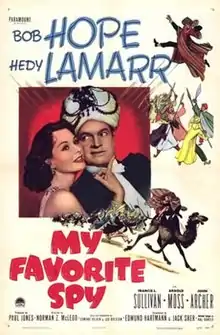| My Favorite Spy | |
|---|---|
 1951 US Theatrical Poster | |
| Directed by | Norman Z. McLeod |
| Written by | Edmund L. Hartmann Jack Sher Hal Kanter Lou Breslow Edmund Beloin |
| Produced by | Paul Jones |
| Starring | Bob Hope Hedy Lamarr Francis L. Sullivan |
| Cinematography | Victor Milner |
| Edited by | Frank Bracht |
| Music by | Victor Young |
Production company | |
| Distributed by | Paramount Pictures |
Release date |
|
Running time | 93 minutes |
| Country | United States |
| Language | English |
| Box office | $2.6 million (US rentals)[1] |
My Favorite Spy is a 1951 American comedy spy film directed by Norman Z. McLeod and starring Bob Hope, Hedy Lamarr and Francis L. Sullivan. It was produced and distributed by Paramount Pictures and forms the third of a loose trilogy featuring Hope including My Favorite Blonde and My Favorite Brunette.
Plot
US intelligence agents recruit burlesque comic Peanuts White to pose as international spy Eric Augustine, whom he resembles, to acquire a million-dollar microfilm in Tangier, Morocco. There, he encounters the irresistible Lily Dalbray, Augustine's one-time "friend," who is now in league with his arch-enemy, Brubaker.
Peanuts is persuaded to take the dangerous assignment via a phone conversation with an unseen President Harry Truman.
Arriving in Tangiers wearing an uncomfortable money belt containing one million dollars in payoff money, Peanuts is assigned a right hand man, Tasso. Peanuts enjoys the part of the assignment where he must surround himself with beautiful women. Repeated attempts on his life he does not enjoy. One one occasion, he and Tasso must dodge assassins inside a 2-man camel costume.
The real Eric Augustine escapes from the hospital and arrives in Tangiers. He goes to Lily's room and without a word, beats her up. As soon as he leaves the room, he is killed by Brubaker's men.
Lily thinks Peanuts hit her and tears into him. Peanuts confesses the deception just to calm her down (finding Augustine's corpse also aids in this).
Peanuts and Lily are captured by Brubaker and taken to his villa. Peanuts is injected with truth serum, but this only causes him to recite some of his old burlesque routines.
After Lily switches loyalties, she and Peanuts escape after setting fire to Brubaker's mansion. They run to the nearest firehouse, don fireman disguises, only to have the fire alarm take them right back to Brubaker's house. They make their final escape in a hijacked fire engine with Peanuts dangling precariously from the highest point of a hook-and-ladder.
Brubaker makes such a public spectacle of himself during the chase that he is recognized and arrested. The microfilm ends up in the right hands. And Lily ends up in Peanuts' hands.
Cast
- Bob Hope as Peanuts White/Eric Augustine
- Hedy Lamarr as Lily Dalbray
- Francis L. Sullivan as Karl Brubaker
- Arnold Moss as Tasso
- John Archer as Henderson
- Luis Van Rooten as Rudolf Hoenig
- Stephen Chase as Donald Bailey
- Morris Ankrum as Gen. Frazer
- Angela Clarke as Gypsy Fortune Teller
- Iris Adrian as Lola
- Frank Faylen as Newton
- Mike Mazurki as Monkara
- Marc Lawrence as Ben Ali
- Tonio Selwart as Harry Crock
- Ralph Smiley as El Sarif
- Joseph Vitale as Fireman
- Nestor Paiva as Fire Chief
- Helen Chapman as Miss Dieckers
- Kasey Rogers as Maria
- Veola Vonn as Tara
- Suzanne Dalbert as Maid
- Torben Meyer as Headwaiter
- Suzanne Ridgway as Dancer
- Steven Geray as Croupier
- Joan Whitney as Woman In Bathtub (uncredited)
- Ralph Sanford as Husband of Woman In Bathtub(Uncredited)
- Chester Conklin as Short Man Hiding In Closet (uncredited)
- Hank Mann as Short Man Hiding In Closet (uncredited)
- Roy Roberts as Johnson, FBI Agent (uncredited)
- Duke York as "Man" (uncredited)
- Ralph Byrd as Unnamed Government Official (uncredited)
- Rolfe Sedan as Room Service Waiter (uncredited)
- Norbert Schiller as Dr. Estrallo (uncredited)
Production
The film was produced from late January to early April 1951 under the working title Passage to Cairo.
Hope's character, Peanuts White, was first conceived as a schoolteacher who, while impersonating a recently deceased gangster, is sent to Cairo to obtain information. The character was later converted into a standup vaudeville comedian who resembles a leading international spy, and is persuaded to impersonate him on a mission to Tangier.
Release
The world premiere of the film took place in Bellaire, Ohio, in the living room of Anne Kuchinka. The Ohio housewife won a letter writing contest sponsored by Hope's radio show, in which participants gave reasons why the premiere should be held in their home. Prior to the screening, a star-studded parade and radio broadcast were held in Bellaire. According to a November 19, 1951 Time article, Corp. Karl K. Diegert of the Army Hospital at Camp Atterbury, Indiana, persuaded Hope, who was known for his USO shows, to do a second screening at the camp the day after Bellaire's.
See also
- My Favorite Blonde (1942) with Bob Hope and Madeleine Carroll
- My Favorite Brunette (1947) with Bob Hope and Dorothy Lamour
References
- ↑ 'Top Box-Office Hits of 1952', Variety, January 7, 1953